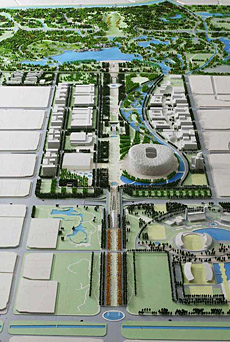
After the Olympics, a smoother, greener Beijing will remain
 |
Unlike Athens and some other host cities, where organizing the games created a mountain of debt and many sports venues remain unused, Beijing and the Chinese government can comfortably afford the approximately $40 billion spent on the Olympics. More importantly, less than a quarter of this sum went to sports venues built specifically for the Olympics, such as the National Stadium, the Bird's Nest. The rest was directed towards infrastructure - for example, new subway lines - and projects including improvements to buses or heating plants for cleaner technologies.
"Many of these changes were necessary for the continued rapid development of Beijing, and the Olympics served to significantly expedite them," says analyst Denis Ma. According to him, the transformation of the ever-expanding Beijing subway is worth it, as it will help reduce emissions from cars and allow for the development of residential districts in the suburbs.
"With improvements in the transportation system, financial services infrastructure, communication networks, and accommodation capacities, post-Olympic Beijing will be in a better position to fulfill its potential as a world-class metropolis," agrees Jing Ulrich from JPMorgan Securities.
The sports venues themselves are also a unique legacy. The new operators of the Bird's Nest, a consortium led by the state investment group CITIC, plan to sell naming rights and make the enormous stadium the home ground of one of Beijing's football clubs while developing a complex of hotels, restaurants, and shops in the vicinity.
The American company AEG Worldwide, which aims to capitalize on the post-Olympic boom, has already teamed up with the Chinese national basketball association to gain the rights to manage the Wukesong Stadium, where the Olympic basketball matches were held. They are also interested in organizing events at the Bird's Nest. "We are interested in the Bird's Nest. We have programs that could occasionally fill the Bird's Nest," said AEG president Tim Leiweke.
However, he believes it is unlikely that Beijing will surpass Shanghai as the main destination for large sports and entertainment events. "Shanghai is probably the most exciting and attractive market in the world for us right now," he added.
Many of the sports venues were pre-designated to be transformed into spaces that will serve the general public in the 17 million-strong Beijing, and others were built near universities.
Equally significant is the way the games have encouraged the construction of new public spaces throughout Beijing, says Cou Chuan, an urban planning expert from the prestigious Tsinghua University in Beijing. Not only will the Olympic park, Olympic Green, in the future compete with Tiananmen Square for the status of the most visited tourist spot, but a number of new parks and green spaces will provide ordinary Beijingers with a place to relax from often cramped living conditions.
"They resemble the squares of European cities in that they provide people with outdoor space for chatting and meeting. This is very useful and will truly change life here," says Cou. Ideally, however, he believes that city officials should pay attention to details when preparing plans and avoid sacrificing historically valuable buildings. Additionally, thousands of people had to clear the space on which the new sports venues, parks, or subway lines were built. "But one must look at costs versus benefits," he adds. "Overall, I think the benefits for Beijing are greater in this case."
The English translation is powered by AI tool. Switch to Czech to view the original text source.
0 comments
add comment












